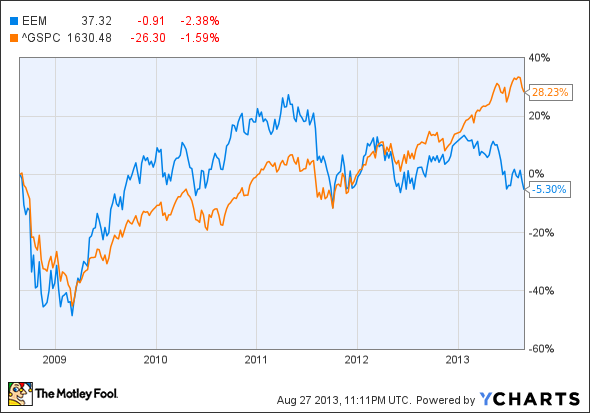Although we don't believe in timing the market or panicking over daily movements, we do like to keep an eye on market changes -- just in case they're material to our investing thesis.
For equity markets, the lazy days of summer may have come to an end this week, with the rising risk of a Western strike against the Assad regime in Syria. U.S. stocks recorded their worst drop since June, with the S&P 500 (^GSPC -1.18%) losing 1.6%, while the narrower, price-weighted Dow Jones Industrial Average (^DJI -1.54%) went down 1.1%.
Naturally enough , that volatility also showed up in the CBOE Volatility Index (^VIX 4.82%), Wall Street's "fear index," which rose another 7.2% today for near-20% increase this week. (The VIX is calculated from S&P 500 option prices and reflects investor expectations for stock market volatility over the coming 30 days.)
Global tension creates international values
Value investors, prick up your ears: I've been watching a trend develop this year and, between rising political risk (see above) and expectations that the Fed will soon begin to taper its bond purchases, it has gathered pace this summer to a point where I feel it's time to mention it. (Technically, I've mentioned it before; I drew attention to the one market investors are ignoring back in July, for example.)
The following five-year graph of the S&P 500 against the iShares MSCI Emerging Markets ETF (EEM -0.24%), the latter of which tracks MSCI's benchmark emerging markets index, shows that the U.S. market's margin of outperformance has never been higher than it is today.
Does that mean one should bet on the U.S. market continuing to outperform emerging markets? If you're a trader, the answer may be yes – momentum effects are real over short-term time frames.
Conversely, however, investors with a multiyear time frame may be more inclined to bet on a reversal in emerging markets' underperformance over the next several years (i.e., overweighting emerging markets stocks in their asset allocation). Why? Because, all other things equal, lower starting valuations imply higher expected future returns. If stocks trade at a discount to their intrinsic value, that valuation gap is a source of outperformance when it closes.
That's why stock returns tend to be mean-reverting over multiyear periods, with periods of above-average returns eventually producing overvaluation, which become a drag on future returns.
Indeed, the latest asset return forecasts from GMO, a large asset manager with tremendous expertise in asset allocation and a good forecasting record, suggest emerging market stocks will return 6.8% on an annualized basis after inflation over the next seven years, which is a bit better than the 6.5% long-term historical return on U.S. stocks and much better than GMO's forecast for large-capitalization U.S. stocks, a dreadful negative 2.1% (although they expect "US High Quality" to achieve a positive return of 3.1%).
Not all emerging markets are equally attractive, of course. The iShares MSCI Turkey ETF (NYSEMKT: TUR) has caught my eye. At a price-to-earnings ratio of 10.7, it's significantly cheaper than the broad iShares MSCI Emerging Markets ETF.






